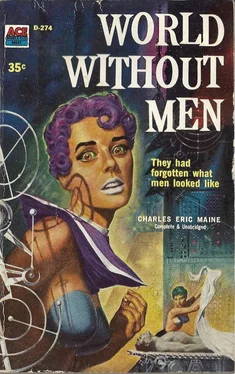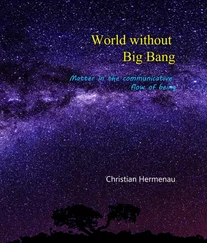Charles Maine - World Without Men
Здесь есть возможность читать онлайн «Charles Maine - World Without Men» весь текст электронной книги совершенно бесплатно (целиком полную версию без сокращений). В некоторых случаях можно слушать аудио, скачать через торрент в формате fb2 и присутствует краткое содержание. Город: New York, Год выпуска: 2013, Издательство: Ace Books, Жанр: Фантастика и фэнтези, на английском языке. Описание произведения, (предисловие) а так же отзывы посетителей доступны на портале библиотеки ЛибКат.
- Название:World Without Men
- Автор:
- Издательство:Ace Books
- Жанр:
- Год:2013
- Город:New York
- ISBN:нет данных
- Рейтинг книги:4 / 5. Голосов: 1
-
Избранное:Добавить в избранное
- Отзывы:
-
Ваша оценка:
- 80
- 1
- 2
- 3
- 4
- 5
World Without Men: краткое содержание, описание и аннотация
Предлагаем к чтению аннотацию, описание, краткое содержание или предисловие (зависит от того, что написал сам автор книги «World Without Men»). Если вы не нашли необходимую информацию о книге — напишите в комментариях, мы постараемся отыскать её.
World Without Men — читать онлайн бесплатно полную книгу (весь текст) целиком
Ниже представлен текст книги, разбитый по страницам. Система сохранения места последней прочитанной страницы, позволяет с удобством читать онлайн бесплатно книгу «World Without Men», без необходимости каждый раз заново искать на чём Вы остановились. Поставьте закладку, и сможете в любой момент перейти на страницу, на которой закончили чтение.
Интервал:
Закладка:
He lay down beside her and ran his fingers lightly over her. She trembled involuntarily. “Don’t go to sleep,” he murmured. “I’ll tell you my story.”
“Even when the first fertility centres were being constructed,” he said quietly, “that section of the civil service that concerns itself with births, deaths and marriages became aware of a certain worrying trend in birth figures, something quite apart from the birth rate itself, which had fallen to a fantastically low level. It became disconcertingly apparent that of the babies being born, more and more were female. Whereas in pre-Sterilin days the ratio of male to female births was approximately fifty-fifty, the balance was now changing. At the time when the thing was discovered and confirmed beyond all dispute there were eight girls born to every boy.
“The information was censored, the first large-scale example of the suppression of vital information. Scientists were appointed to investigate the phenomenon, and they, in turn, finding themselves involved in complex social mathematics, enlisted the aid of giant electronic computers. And so the electronic brain began to enter the scene as an instrument of government policy.
“The new system of compulsory fertility worked, though not without some initial public protest. Women, under threat of large fines and imprisonment, reported to the centres, and were generally delighted to find that far from resembling maternity hospitals they were vast and luxurious rest centres set in spacious, secluded grounds in the rural areas of the country. Every facility for amusement and entertainment was provided for, and life, during the period of pregnancy, was idle and pleasurable.
“For the purposes of impregnation they were, during the first few years, permitted to select their own male partner; but later the government, in consultation with the electronic brains, decided to apply eugenic methods to human breeding. Male partners were selected according to scientific genetic principles, and the act of mating became a precision function with little or no emotional content. Once fertilization of the ovum had been achieved, complete promiscuity was, of course, then permissible.
“During this phase in the development of the fertility centres, certain quarters in the buildings were assigned to men, who had been eugenically selected for what might be called stud purposes. Men still lived at the fertility centres, but the trend in recent years has been towards artificial insemination, partly because of the greater certainty of precise eugenic breeding, and partly for another more sinister reason. Meanwhile the eugenically approved men, having made their contribution to the impersonal insemination machinery, were retained as a form of amusement for the women during their pregnancy.
“The move towards artificial insemination had resulted directly from the shifting balance of male to female births. Although the birth rate rose incredibly once the fertility system had been inaugurated, the sex of the great majority of the new children was female. Nine out of every ten were girls, and the proportion was still rising. Next year it might be ninety-two out of every hundred; the year after, ninety-four… And perhaps in the near, the too near, future, there would be no more boys. Only girls.
“Scientists and electronic brains worked intensively to discover the reason for this inexplicable disappearance of the male sex from the birth statistics. Some thought that Sterilin itself was acting as a sex-discriminating poison, acting through the female ovum to destroy any cell that might be fertilized by a twenty-three chromosome male gamete. But even the most sensitive tests failed to show that there was any foundation to this theory. Female ova, to exist at all, had to be entirely free from Sterilin. The slightest trace of the drug in the female endocrine system completely inhibited ovulation. And extensive tests failed to prove that there was any difference in reaction between male and female gametes to Sterilin — or any reaction at all, for that matter. Sterilin, being derived from estrogen, had no effect whatever on male cells.
“The true answer was much more subtle and less capable of conclusive proof. It was postulated by a Dr. Stenniger that the attenuation of the male statistic in birth figures was a blind reaction of nature to the mass Sterilin addiction of the human race. From nature’s point of view almost the entire female half of the human species had become sterile. What was the obvious compensating action? Simply to produce more females to replace those who had lost their capacity to conceive,” Dr. Stenniger insisted.
“The only evidence to support this hypothesis lay in old population records which seemed to show that after major world wars in former years, there had been an increase of male births, presumably to compensate for the large number of males destroyed as a result of war. In a similar way, Dr. Stenniger pointed out, nature was compensating now for what was, in the planetary sense, a mass destruction of the female component of the species.
“Stenniger’s hypothesis was accepted slowly and reluctantly; but it was accepted. Nature, it was realized, is slow to act, slow to produce change, and the danger lay in the fact that such change, once established, might prove to be irreversible. Evolution is a one-way street, and, like entropy, never works backwards.
“The elimination of male births had taken some seventy years to accomplish. Even if nature were co-operative enough to reverse the process (supposing that Sterilin could be universally banned), it would presumably take another seventy years to re-establish the male. But seventy years was a lifetime; it could witness the entire destruction of the human race by lack of men.
“On Government instructions, scientists concentrated on the study of sexual cytology within strictly specified terms of reference. Their object was to produce, in the laboratory, a normal fusion of male gamete and female ovum to produce a living composite cell of forty-seven chromosomes, capable of developing, given suitable gestative conditions, into a male child. They failed. During more than two hundred thousand fertilization tests not a single male embryo was produced, and, strangest thing of all, there was no detectable reason why it should be so.
“They were working, of course, on a purely statistical basis, assuming that any particular sample of male gametes would contain equal numbers of cells with and without the vital sex chromosome. Had they been able to separate these two different types of cells, a more conclusive result could have been obtained, but there was no way of differentiating between the cells without first killing and staining them for microscopic examination. Even so, such examination merely confirmed that both types of gametes, with and without the necessary sex chromosome, were present in equal proportion. And yet the male-producing gametes persistently failed to function. It was as if nature had decreed that henceforth only gametes containing twenty-four chromosomes would be capable of fertilizing the female ovum. It was sterility in reverse, a vicious and uncontrollable reaction aroused by the indiscriminate use of Sterilin on a world-wide scale.
“The governments of the planet took no steps to prohibit the use of Sterilin. Apart from the undeniable fact that it would have been impossible, it was clearly seen that such a move would achieve nothing, for birth statistics would still favour the female for decades and perhaps generations to come. The immediate problem was that of racial survival. If the male sex were to become extinct (as indeed it might), how could the remaining female section of humanity propagate itself?
“The answer was obvious to scientists and government alike. Research had to be directed towards a form of artificial parthenogenesis — induced virgin birth. By the application of suitable drugs, and perhaps radiological techniques, the unfertilized female ovum had to be persuaded to split into two cells, and so start the inevitable chain reaction of embryonic growth, resulting in birth.
Читать дальшеИнтервал:
Закладка:
Похожие книги на «World Without Men»
Представляем Вашему вниманию похожие книги на «World Without Men» списком для выбора. Мы отобрали схожую по названию и смыслу литературу в надежде предоставить читателям больше вариантов отыскать новые, интересные, ещё непрочитанные произведения.
Обсуждение, отзывы о книге «World Without Men» и просто собственные мнения читателей. Оставьте ваши комментарии, напишите, что Вы думаете о произведении, его смысле или главных героях. Укажите что конкретно понравилось, а что нет, и почему Вы так считаете.












